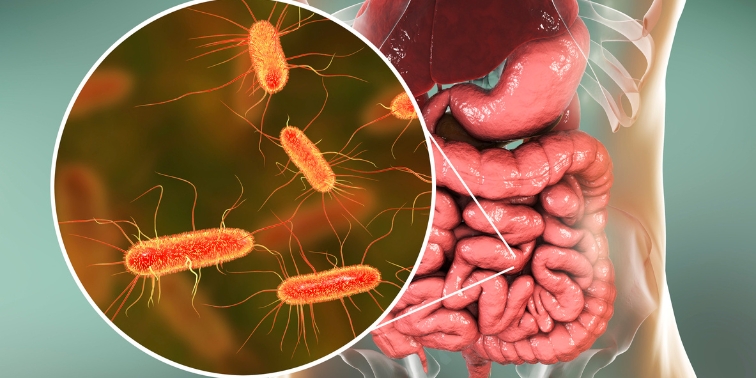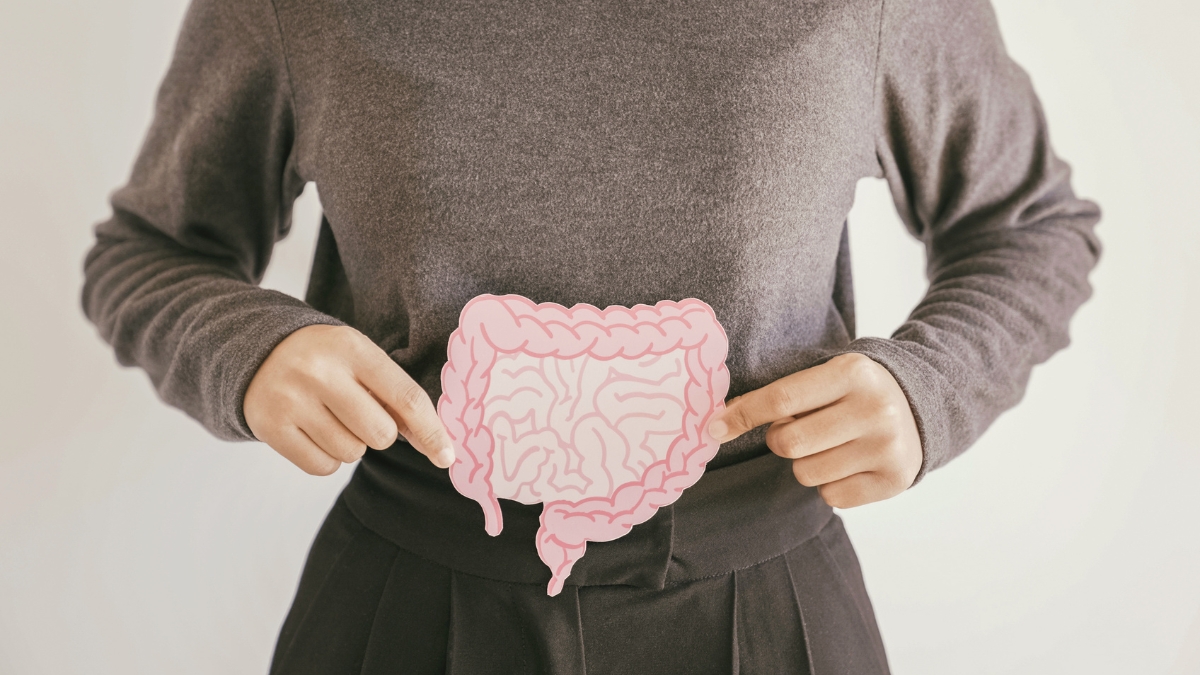Have you ever wondered why some people seem to effortlessly maintain a healthy weight while others struggle despite their best efforts? While diet and exercise undoubtedly play a crucial role, emerging research suggests that the answer might lie within your gut – specifically, the trillions of microorganisms that call it home.
The gut microbiome, a complex and dynamic ecosystem of bacteria, viruses, fungi, and other microbes, has been linked to various aspects of human health, from digestion and immunity to mental well-being. Recent studies have also revealed a fascinating connection between the gut microbiome and weight management, suggesting that a healthy gut could be the key to unlocking your weight loss potential.
Understanding the Gut Microbiome

The gut microbiome is a vast and intricate network of microorganisms residing primarily in the large intestine. These microbes play a vital role in human health, contributing to various physiological processes, including:
-
Digestion: Gut microbes help break down complex carbohydrates, fibers, and other nutrients that the human body cannot digest on its own. They also produce essential vitamins, such as vitamin K and B vitamins.
-
Immunity: The gut microbiome interacts with the immune system, helping to train and regulate its responses. A balanced gut flora can enhance immune function and protect against infections.
-
Metabolism: Gut microbes influence metabolism by regulating energy expenditure, fat storage, and glucose metabolism. Imbalances in the gut microbiome, known as dysbiosis (a disruption of the healthy balance of gut bacteria), have been linked to metabolic disorders, such as obesity and type 2 diabetes, a condition where the body's cells become less responsive to the hormone insulin (insulin resistance).
-
Mental Health: The gut microbiome communicates with the brain through the gut-brain axis, a bidirectional network of nerves, hormones, and immune signals. Research suggests that gut microbes can influence mood, anxiety, and even cognitive function.
The Gut-Weight Loss Connection
The link between the gut microbiome and weight management is a rapidly evolving area of research. Several studies have demonstrated that individuals with obesity tend to have a less diverse gut microbiome compared to those with a healthy weight. Additionally, dysbiosis has been associated with increased fat storage, inflammation, and insulin resistance. All of these factors can contribute to weight gain and difficulty losing weight.
Gut Health and Metabolism: A Complex Relationship
The gut microbiome's impact on weight involves intricate interactions with our metabolism. Certain gut microbes are more efficient at breaking down complex carbohydrates and fibers, leading to increased calorie absorption. The gut microbiome also plays a role in fat storage by influencing hormones that regulate appetite and metabolism. Additionally, imbalances in the gut microbiome can trigger chronic low-grade inflammation, which has been linked to obesity and metabolic disorders. Inflammation can interfere with how our bodies respond to insulin, leading to increased fat storage and difficulty losing weight.
Real-Life Success: Sarah's Story
Sarah, a 35-year-old woman who had struggled with her weight for years, decided to focus on improving her gut health after learning about the gut-weight loss connection. She started incorporating more fiber-rich foods, fermented foods like yogurt, and probiotic supplements into her diet. She also made an effort to manage stress through yoga and meditation. Over several months, Sarah noticed not only a gradual weight loss but also improved digestion and increased energy levels. She felt empowered by the positive changes in her body and overall well-being.
Nurturing a Healthy Gut for Weight Loss
While the research on the gut microbiome and weight loss is still ongoing, there are several steps you can take to cultivate optimal gut health and potentially support your weight loss journey.
Diet
Diet plays a crucial role in shaping the gut microbiome. A diet rich in fiber, fruits, vegetables, and whole grains provides nourishment for beneficial gut microbes and promotes diversity. Fermented foods, such as yogurt, kefir, and sauerkraut, contain live bacteria that can help replenish the gut microbiome. On the other hand, a diet high in processed foods, sugar, and unhealthy fats can disrupt the gut microbiome and contribute to dysbiosis.
10 Fermented Food Recipes for Gut Health
-
Sauerkraut: A classic fermented cabbage dish with a tangy flavor, sauerkraut is simple to make and packed with probiotics.
-
Kimchi: A spicy and flavorful Korean staple, kimchi is made with fermented vegetables like cabbage, radish, and scallions.
-
Kombucha: A fizzy and refreshing fermented tea beverage, kombucha is available in various flavors and is known for its probiotic content.
-
Yogurt: A creamy and versatile fermented milk product, yogurt is a good source of probiotics and calcium.
-
Kefir: Similar to yogurt but thinner in consistency, kefir is a fermented milk drink with a slightly tangy taste and a high probiotic content.
-
Sourdough Bread: Made with a fermented starter culture, sourdough bread has a unique flavor and texture and is easier to digest than regular bread.
-
Tempeh: A fermented soybean product, tempeh is a good source of protein and has a nutty flavor and firm texture.
-
Miso: A fermented soybean paste, miso is a common ingredient in Japanese cuisine and is used to make miso soup and other dishes.
-
Pickles: Fermented cucumbers or other vegetables, pickles are a tangy and crunchy condiment that can be enjoyed on their own or added to sandwiches and salads.
-
Fermented Hot Sauce: A flavorful and spicy condiment, fermented hot sauce is made with chili peppers, garlic, and other ingredients and has a complex flavor profile.
Probiotics and Prebiotics
Probiotics are live microorganisms that, when consumed in adequate amounts, can confer health benefits. Probiotic supplements or foods containing probiotics, such as yogurt and kefir, can help introduce beneficial bacteria into the gut. Prebiotics are non-digestible fibers that serve as food for beneficial gut microbes. Foods rich in prebiotics, such as onions, garlic, bananas, and asparagus, can help nourish the gut microbiome and promote its growth.
Exercise
Regular physical activity has been shown to positively influence the gut microbiome, increasing its diversity and promoting the growth of beneficial microbes. Exercise can also help reduce inflammation and improve insulin sensitivity, both of which are beneficial for weight management.
Stress Management
Chronic stress can negatively impact the gut microbiome, leading to dysbiosis and inflammation. Stress management techniques, such as meditation, yoga, and deep breathing exercises, can help mitigate the harmful effects of stress on the gut and support a balanced gut flora.
Sleep
Adequate sleep is essential for overall health, including gut health. Sleep deprivation has been linked to changes in the gut microbiome, including decreased diversity and increased abundance of microbes associated with obesity and inflammation. Aim for 7-8 hours of quality sleep each night to support a healthy gut and promote weight loss.
The Power of Personalized Nutrition
While general dietary recommendations can be helpful, emerging research suggests that personalized nutrition, tailored to an individual's gut microbiome, may offer a more targeted approach to weight management. By analyzing the composition of your gut microbiome, healthcare professionals can provide specific dietary recommendations that promote the growth of beneficial microbes and support weight loss.
Fecal Microbiota Transplants (FMT)
In cases of severe gut dysbiosis, fecal microbiota transplants (FMT), or the transfer of healthy gut bacteria from one person to another, may be considered. FMT is an emerging and experimental procedure that has shown some promise in treating certain gut disorders. Research is ongoing to explore its potential role in weight management.
Beyond Weight Loss: The Broader Impact of a Healthy Gut
While the gut-weight loss connection is undoubtedly exciting, it's important to remember that a healthy gut microbiome offers benefits beyond weight management. A thriving gut ecosystem can enhance overall health and well-being, contributing to:
- Improved digestion: A healthy gut microbiome aids in digestion, reducing symptoms such as bloating, gas, and constipation.
- Enhanced immunity: A balanced gut microbiome strengthens the immune system, protecting against infections and autoimmune diseases.
- Reduced inflammation: A healthy gut can help reduce chronic inflammation, lowering the risk of various health problems, including heart disease, diabetes, and cancer.
- Improved mental health: A healthy gut microbiome supports mental well-being, reducing anxiety and depression and promoting cognitive function.
Conclusion
The gut microbiome is a fascinating and complex ecosystem that plays a crucial role in human health, including weight management. By understanding the intricate relationship between gut health and weight, we can unlock new strategies for achieving and maintaining a healthy weight.
Fostering a healthy gut through diet, exercise, stress management, and other lifestyle factors can not only support weight loss but also promote overall health and well-being. Remember, the journey to a healthy weight begins in the gut. By nourishing your microbiome and making informed choices, you can transform your body from the inside out and achieve lasting weight loss success.








8 Responses
So, you’re telling me that my gut is basically a tiny, internal zoo filled with critters that decide if I’m slim or not? 😂 That’s kind of wild! I’m picturing them having little meetings, deciding my fate. Seriously though, I eat pretty healthy, but I do love my cheese and wine… Are those gut-zoo parties ruining my chances of fitting into my favorite jeans? Also, how do we know this isn’t just another one of those trendy health fads? Is there actual proof that all this focus on fermented food like sauerkraut and kimchi makes a real difference in the long run?
Lea, I love the ‘gut-zoo’ analogy! 😂 It really is like that, isn’t it? And don’t worry, enjoying cheese and wine in moderation is unlikely to throw a complete rave in your gut-zoo. It’s more about the overall balance. While the research is still evolving, there’s growing evidence that the microbiome does play a role in weight. Think of it like this: a diverse and happy gut-zoo is more likely to process food efficiently and keep inflammation in check, which can help with weight management. As for the fermented foods, they are like sending in reinforcements to the good bacteria in your gut. Will they magically melt away the pounds? Probably not, but they can contribute to a healthier gut environment. It is a piece of the puzzle.
Okay, this is all very interesting, but also a little overwhelming. Probiotics, prebiotics, fermented this, fermented that… It feels like I need a PhD in microbiology just to figure out what to eat! And what about those fecal transplant things? That sounds a bit… extreme, to say the least. Is it really necessary to go to such lengths for a healthy gut? I mean, are we all just supposed to start swapping poop now? 😅 I’m all for a healthy lifestyle, but this seems a bit much.
Rowan, I hear you! It can definitely feel like information overload. The good news is, you don’t need a PhD to improve your gut health. Start with simple changes: more fiber, more fruits and veggies, maybe some yogurt. Small steps can make a difference. And you’re right, FMT is pretty extreme! It’s definitely not for everyone and is generally reserved for specific medical conditions, it is not a mainstream solution for weight loss, don’t worry, we’re not suggesting poop-swapping parties! 😄 The main takeaway is that our gut health is important, and there are many ways to support it without resorting to drastic measures. Just find what works for you and your lifestyle.
This article is mind-blowing! I’ve always thought weight loss was just about calories in, calories out, but this gut microbiome stuff is a game-changer. I’m especially intrigued by the fermented foods. I love sauerkraut, but I’m not so sure about kimchi…it sounds a bit intense. Any tips for incorporating more fermented foods into my diet without setting my taste buds on fire?
Hi Evelyn! I’m so glad you found the article interesting! It’s definitely true that the gut microbiome adds a whole new dimension to the weight loss conversation. And I totally get your hesitation about kimchi – it can be spicy! But don’t worry, there are ways to enjoy the benefits of fermented foods without the fiery burn. Start with milder options like plain yogurt (make sure it has live and active cultures) or kefir. You can also try making your own fermented veggies at home. It’s surprisingly easy, and you can control the level of spiciness. For kimchi specifically, you can look for mild versions or even rinse it before eating to reduce the heat. Another trick is to pair it with cooling foods like avocado or cucumber. The key is to start slow and gradually introduce different fermented foods into your diet. Your taste buds will adjust over time, and you might even find yourself craving kimchi before you know it!
This is fascinating! I’ve been struggling with my weight for years, and I’ve tried everything – low-carb diets, intense workouts, you name it. I’m definitely going to look into improving my gut health. The part about personalized nutrition is especially intriguing. How do you actually get your gut microbiome tested? Is it something I can do at home, or do I need to see a doctor?
Hi Carolyn! Thanks for your comment! It’s great that you’re exploring the gut microbiome as part of your weight management journey. It can be a real game-changer! You’re right to be curious about gut microbiome testing. There are definitely at-home testing kits available now, which is super convenient. These kits usually involve collecting a stool sample and sending it off to a lab for analysis. They’ll then provide you with a report detailing the composition of your gut microbiome. However, while these tests can be informative, it’s always a good idea to discuss the results with a healthcare professional, like a doctor or registered dietitian. They can help you interpret the results in the context of your overall health and provide personalized recommendations for diet and lifestyle changes. They can also help you determine if further testing or treatment is needed. So, while at-home kits are a great starting point, professional guidance is always recommended for the best results.